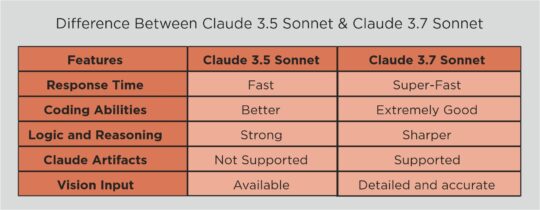Claude is a generative AI chatbot by Anthropic, a generative AI model. It’s constantly advancing with new versions coming up. The recent ones, Claude 3.5 Sonnet and Claude 3.7 Sonnet, offer major enhancements over their predecessors.
So, the debate lies in which model to consider. In this blog, we’ll understand the key differences between Claude 3.5 Sonnet and Claude 3.7 Sonnet across different factors such as speed, real-world applications, coding and more. This way, you can decide which is best for your needs.
Let’s get through the blog and learn more.
Understanding Claude 3.5 Sonnet and Claude 3.7
Claude 3.7 Sonnet is one of the most advanced models released to date from Anthropic. Alongside, it stands as the first hybrid model on the market. Claude 3.7 outperforms Claude 3.5 in different factors such coding, response times, reasoning and handling tasks.
Now talking about Claude 3.5 Sonnet, which is the latest release in the Claude 3.5 model family. It works best as compared to Claude 3 Opus on a range of factors such as speed and cost of mid-tier model, Claude 3 Sonnet.
Also, Claude 3.5 notched up some pretty impressive scores against many industry benchmarks reinforcing its notable standing as a reliable AI system and high performing in many ways.
Differences Between Claude 3.7 and Claude 3.5
1. Intelligence and Reasoning
Claude 3.7 Sonnet offers top AI reasoning breakthrough with its dual thinking mode, which is normal and extended. The extended mode allows for observable, step-by-step reasoning, providing higher transparency and logic, especially for sophisticated tasks.
On the other hand, the Claude 3.5 Sonnet features robust reasoning but without these double modes. It performs well for general-purpose work but fails to provide similar explainability or depth in its problem-solving process.
2. Performance Speed
In terms of responsiveness, Claude 3.7 Sonnet beats the previous version by processing up to 2x faster outputs under real-world use scenarios. This is particularly valuable for working professionals dealing with time-sensitive processing.
Claude 3.5 Sonnet remains fast and efficient but lags slightly in dealing with long, multi-turn dialogues or computer-heavy tasks.
3. Coding Capabilities
Claude 3.7 Sonnet performs top-notch in software development, producing state-of-the-art results on benchmarks such as SWE-Bench Verified and TAU-bench. It's extremely efficient in debugging, producing clean front-end code, and resolving difficult logic issues.
Although Claude 3.5 Sonnet performs well in coding and is an early tool used in public beta; it lags behind 3.7 in terms of depth and accuracy, particularly in edge-case situations.
4. Claude Artifacts Support
One of the best features of Claude 3.7 is its support for Claude Artifacts. The feature allows users to see and edit live outputs like documents, code, and structured content in a side panel.
It improves productivity by allowing for a more interactive and iterative process. Claude 3.5 Sonnet does not have this feature, meaning its usability is reduced when working in collaborative workflows or document-oriented tasks.
5. Context Understanding
Claude 3.7 Sonnet exhibits better comprehension of long, complex prompts. It is more likely to maintain context over longer sessions and thus best suited for thorough analysis, writing, or research. Conversely, Claude 3.5 Sonnet is good at regular conversations but tends to lose context at times in longer or more intricate dialogues or tasks.
6. Vision and Multimodal Input
Vision features in Claude 3.7 have been greatly improved. It is capable of interpreting images, charts, and screenshots more precisely, giving elaborate and contextually meaningful results. Though Claude 3.5 Sonnet also accepts image inputs, its output is a bit less sophisticated, particularly when dealing with dense or technical visual content.
Head-to-Head Comparison: Claude 3.7 Sonnet vs Claude 3.5
Claude Artifacts: The Game-Changer
Claude 3.7 comes with one of the top features in Claude 3.7 update - the Claude Artifacts feature. The Claude Artifacts feature shows users the capability to preview and actively work, no matter if it is a code file, documents, etc. in a side panel, all while seamlessly staying within Claude, without changing tabs or switching between copy-pasting each time into external tools.
This offers a a much better experience for developers, marketers or any knowledge worker alike, who simply want to improve their workflow. Want to edit a press release, look at a report, or test a code block? You can now do it live, in Claude.
All of this alone puts Claude 3.7 in a class of its own with respect to Document Centric, Iterative based work.
Limitations and Considerations
Claude 3.5 Sonnet is still a great option for routine tasks, brief conversations, or when you don't require new features.
Claude 3.7 Sonnet will consume slightly more tokens on account of lengthy outputs (although more intelligent responses tend to compensate for this).
As of writing this, Claude 3.7 is currently only accessible through Claude.ai (Pro)—there isn't yet a distinct API or model designation to invoke it through outside tools.
Wrapping it Up
When comparing Claude 3.7 Sonnet and Claude 3.5 Sonnet, it’s clear that Cloude 3.7 Sonnet is here with improving response, security and intelligence. It outperforms Claude 3.5 Sonnet in coding, reasoning, and improving the way it responds to sensitive queries.
As Claude 3.5 Sonnet is ideal for generic use, the enhancements in 3.7 make it the first choice for heavy tasks. Afterall, the choice is yours! You can try both and see which works best for you!
Keep reading all the tech blogs here.
Explore More: Claude 3.7 Sonnet: Key Features, How to Access and Performance Benchmarks





